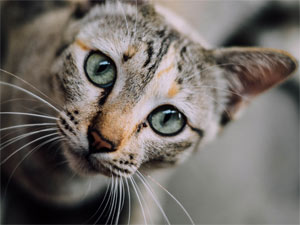We all know that keeping the home safe is important for people, and it’s just as important for our pets!
Pets just do what they do! Each animal has its own manner of going through life, exploring, playing, sleeping and eating as suits their individual nature.
But unlike people, pets don’t always know that there can be things in a human home that can harm, and even kill them. It’s up to us to do the thinking for them and make sure the home is safe and worry-free for all.
Keeping Your Furry Friends Safe: The Hidden Dangers in Every Household
by Sally Perkins
As an owner, the last place you would imagine your pet having a potentially fatal accident is in the comfort of your home, the site of countless behind-the-ear scratches and wagging tails. While keeping your pet away from natural predators, uncertain terrain and their known food allergies are common tenants of animal ownership, did you know that there are also unseen aspects of household cleanliness that could severely impact their health?
Unsafe Toxins Within Household Cleaning Products
Unfortunately, countless cleaning products can deliver both short and long term damage to your pet. While the common rule of thumb is to pet-proof your home just as you would for a toddler or small child, there are extra precautions you can take to ensure that your pet will not fall victim to a careless oversight. The strong chemicals/toxins used to disinfect and sanitize leave behind strong vapors that while at most are mildly upsetting to humans, can prove fatal to animals.
Sharing your home with your pet includes every surface you clean/use, not just the areas your pet frequents, meaning that just because your pet doesn’t use the toilet doesn’t mean that they cannot get seriously ill by ingesting toilet water treated with harsh cleaners. Laundry detergents and common cleaning products such as multipurpose wipes, mildew removers and tile scrubs often contain the following chemicals that are dangerous to your pet: bleach, chlorine, ammonia, phenols, isopropyl alcohol, formaldehyde, phthalates, phenols and perchloroethylene.
Putting a safety lock on the cupboards where these cleaners are stored is not enough of a precaution, as your pet may lick/lay on a surface that has been treated with these harsh chemicals so it is best to avoid them altogether. There are many cleaning products that are pet-friendly, and can be used without the fear of your pet developing a skin, facial, or internal injury.
Other Dangers and How to Avoid Them
While cleaning products are widely used and are therefore the most direct danger to pets, there are other safety hazards lurking in your home at any given moment. While humans can easily detect the difference between garbage and food items, pets have a harder time differentiating trash from treasure and will often nibble without hesitation. Despite the fact that some garbage cans are outfitted with child-proof/pet-proof locking mechanisms, it is imperative to take extra care when disposing of items such as batteries, broken glass, medications, and paper towels as they pose a serious risk to your pets.
Also, take care to shelve fluids such as antifreeze in your garage instead of storing them at floor/pet level, as animals are drawn to the sweet smell of its active ingredient, ethylene glycerol. This chemical is extremely dangerous and fatal to animals in even the smallest of doses.
With common sense and basic planning, you can keep your pet safe from the majority of at-home health hazards. With the use of natural cleaning products free from harsh chemicals and taking extra care to scan the floors/countertops for ingestible dangers you and your pet can enjoy your home worry-free.
Photo courtesy of Chaiyaporn Atakampeewong.
Do you have a story about pet safety solutions that you’d like to tell? Simply sign up on Pet Talk and join in!
Join us on Facebook too! Pets, Animals, and People: Our World United
